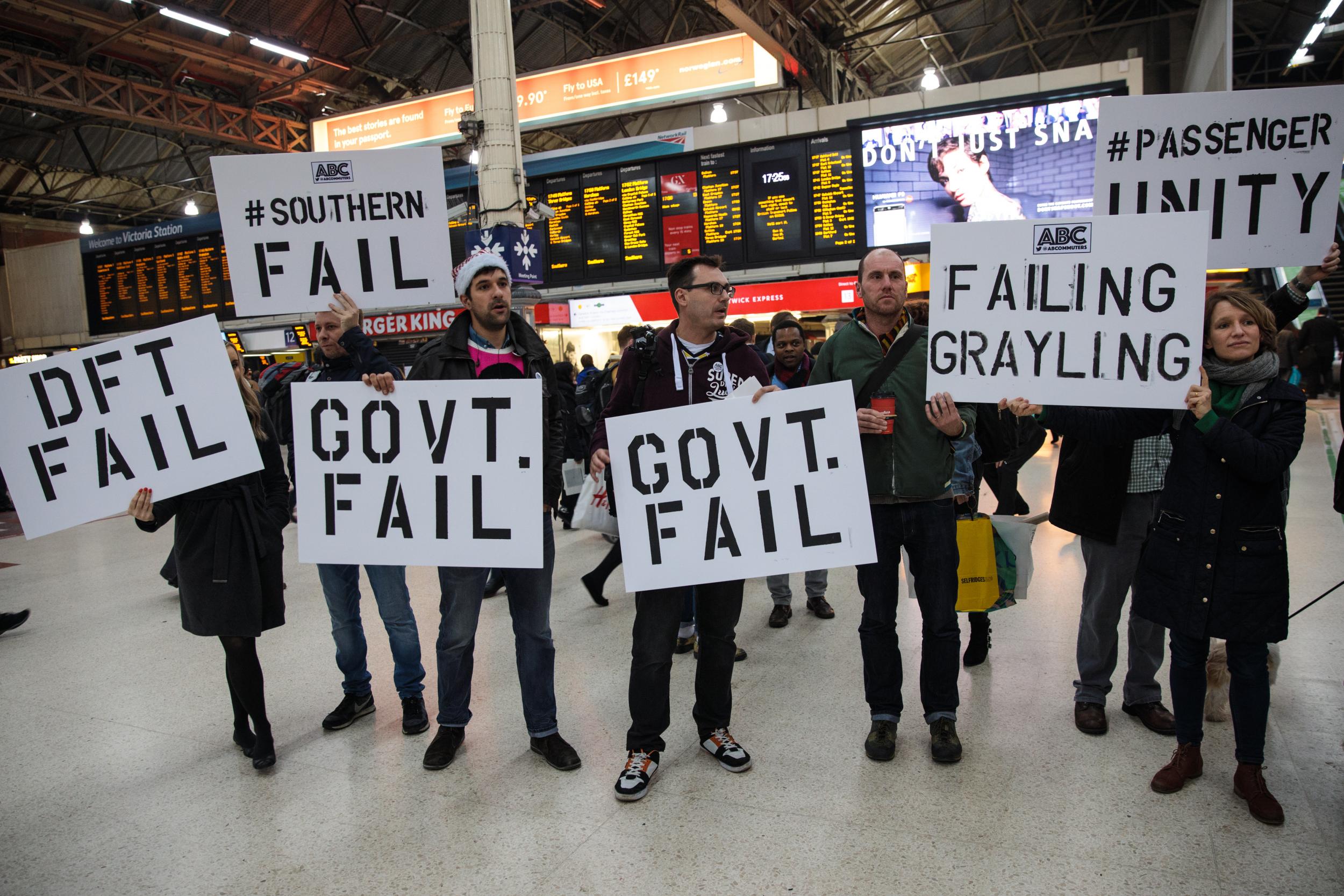Government helped make UK's biggest rail franchise the 'worst', major report finds
Damning indictment threatens to reignite the debate over nationalisation ahead of a Commons vote

Britain’s largest rail franchise has become the “worst” performing as a result of bad Whitehall planning and industrial action, a damning report has concluded.
The UK’s spending watchdog found that in the last two-and-a-half years almost 150,000 trains were cancelled or delayed on the franchise running services across swathes of England.
Its analysis threatens to reignite the debate on rail nationalisation, as ministers face a Commons vote on Wednesday over a separate franchising decision which may leave the taxpayer £2bn poorer.
The National Audit Office document shines a light on the severe problems faced by the Thameslink, Southern and Great Northern franchise run by rail firm Govia.
It declared the franchise has failed to deliver value for money, with passengers suffering the worst disruption anywhere on the network since services began in September 2014.
While it said industrial action had been a “major contributor”, it explained that many problems could have been avoided were it not for a poor understanding of the challenges at the Department for Transport.
NAO Head Amyas Morse said: “Over the last three years long-suffering passengers on the Thameslink franchise have experienced the worst performance on the rail network.
“Some of the problems could have been avoided if the Department had taken more care to consider passengers in its design of the franchise.”
The NAO inquiry noted that the “complex and ambitious” franchise now has the highest passenger numbers in the country and includes four major train services operating on a very congested part of the railway with unreliable infrastructure.
DfT officials failed to grasp the potential impact on passengers of combining an increase in capacity, targets to improve services and expansion of driver-only operated trains, which has led to strikes by trade union members.
Since Govia began operating the full franchise in July 2015, around 146,000 trains, 7.7 per cent of services, have either been cancelled or delayed by over half an hour, compared with 2.8 per cent on the rest of the network.
The DfT and Govia say industrial action was the biggest cause, while the firm was also hit by a shortage of drivers.
The NAO report said: “The Department did not fully evaluate the possible effects on passengers of different scenarios of industrial action before awarding the contract, nor did it ask Govia Thameslink to do so.
“The Department did not seek sufficient assurance that Govia Thameslink would have enough train drivers when it took on the franchise.”
Its report found the DfT contracted Govia to deliver increased services, despite concerns from Network Rail and the firm that the network could not support the proposals.
The watchdog added: “The Department and Network Rail did not have a good understanding of the underlying condition of the existing network at the point when the Department set the requirements of the franchise.”
The report noted that the Department has enforced the terms of its contract with Govia, that the firm will fund £13.4m of improvements as part of a settlement and that performance is improving, but said passengers continue to face bad services.
Ministers claimed the report confirmed the primary cause of delays and cancellations was is a direct result of industrial action, and called on the RMT union to call off strikes.
A DfT spokesman said: “Clearly the disruption passengers have experienced is unacceptable but the NAO recognises that service has improved over the last 12 months.
“The Government has taken a number of steps to ensure this improvement, including the provision of an additional £300m to improve reliability on the Brighton Mainline. We expect service improvements to continue as the Thameslink programme is completed.”
The RMT, which has been embroiled in a dispute with Southern over the role of guards for 20 months, described the report as “dynamite” and claimed it proves the Government has given Govia “a free hand to slash staff and run services into the ground”.
Govia chief executive Charles Horton said the difficulties faced by the franchise have “sometimes been greater than expected and we regret the disruption caused to our passengers”.
He went on: “I am more confident than ever that its trailblazing achievements will be felt by rail travellers for generations to come.”
The report is another blow for Transport Secretary Chris Grayling who recently faced intense criticism over his decision to “bail out” Virgin trains from a separate multimillion-pound franchise deal.
The move – which it is claimed could see taxpayers lose out some £2bn – will be the subject of a Commons vote on Wednesday as Labour attempts to increase pressure on the Government over the UK’s railways.
Shadow Transport Secretary Andy McDonald will use the motion to demand Mr Grayling detail the cost to the public purse of the decision to allow Virgin out of its franchise deal. He will also warn that a failure to take services back into public ownership will result in other struggling train firms demanding similar bailouts in future.
Mr McDonald said: “[Govia] passengers understand the failings of privatised rail as well as anyone.
“The NAO claim that passenger misery could have been avoided if the DfT had taken more care to consider passengers is true for the entire railway.
“Government payouts to companies failing to deliver decent services, soaring fares and poor industrial relations are hallmarks of privatised rail.”
He added: “A refusal to consider public ownership, even as a last resort, leaves our Transport Secretary dancing to the tune of private rail companies.”
Subscribe to Independent Premium to bookmark this article
Want to bookmark your favourite articles and stories to read or reference later? Start your Independent Premium subscription today.

Join our commenting forum
Join thought-provoking conversations, follow other Independent readers and see their replies